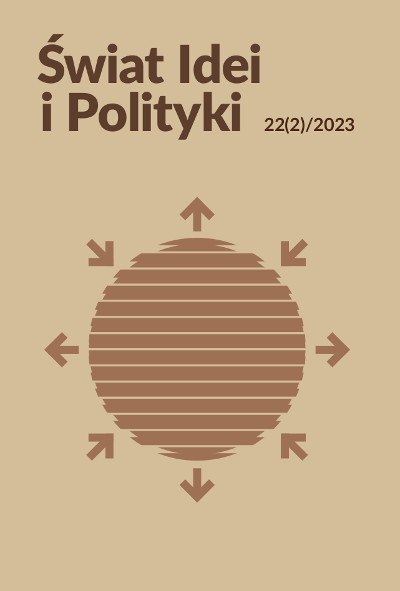Different faces of populism in Venezuela. Comparison of governing styles and media image of Hugo Chávez and Nícolas Maduro
DOI:
https://doi.org/10.34767/SIIP.2023.02.08Keywords:
populism, Latin America, Venezuela, media, Hugo Chávez, Nícolas MaduroAbstract
The aim of this article is to conduct a comparative analysis of the discourses and rhetoric in the public speeches of two consecutive Venezuelan presidents – Hugo Chávez and Nícolas Maduro. Although both politicians have been identified in the literature as representatives of Latin American populism, their media activities, campaign styles, and governing methods differ significantly, as do their perceptions by the public and the international community. This analysis also takes into account the evolution of both presidents’ images during their respective terms in office, against the backdrop of the ongoing political-economic crisis. The presence of Chávez and Maduro in the media – both traditional, such as radio and television, and new (especially on social media platforms) – as well as their narrative-building techniques are of particular importance in this context. The reflection also includes the manipulations used by both politicians and the symbolic sphere to which they referred in their speeches. Such a comparison allows us to recognize that Latin American populism, which belongs to the so-called “third wave,” is a uniquely complex and internally diverse phenomenon, even within one country and successive presidential terms.
References
Álvarez Riccio, V.M. (2016). Exploración de youtube en Venezuela. Estudios venezolanos de comunicación, 175, 153–160.
Bellaviti, S. (2021). La Hora de la Salsa: Nicolás Maduro and the Political Dimensions of Salsa in Venezuela. Journal of Latin American Studies, 53(2), 373–396.
Carpizo, J. (2006). Características esenciales del sistema presidencial e influencias para su instauración en América Latina. Boletín mexicano de derecho comparado, 39(115),57–91.
Colussi, M. (2013). Venezuela: la necesidad de una revolución en la revolución. Revista FAIA – Filosofía Afro-Indo-Abiayalense, 2(12).
Chávez, H. (2012). Programa de la Patria 2013–2019. Caracas.
Duarte, M. (2013). Redes de metáforas cognitivas en el discurso político, de Hugo Chávez. Revista Latinoamericana de Estudios del Discurso, 13(1), 57–78.
Erlich, F. (2005). La relación interpersonal con la audiencia: El caso del discurso del presidente venezolano Hugo Chávez. Revista Signos, 38(59), 287–302.
García Montesdeoca, J.M. (2015). Simón Bolívar como instrumento ideológico en el discurso de Hugo Chávez, para articular la identidad nacional de los venezolanos (1998–2002).Guayaquil: Universidad Casa Grande. Facultad de Administración y Ciencias Políticas.
Herrera, I. & Kurmanaev, A. (2021, November 23). In Venezuela’s Flawed Vote, Maduro Shows One Way to Retain Power. New York Times.
Koobak R., Tlostanova, M. & Thapar-Björkert, S. (eds.) (2021). Postcolonial and Postsocialist Dialogues Intersections, Opacities, Challenges in Feminist Theorizing and Practice. London: Routledge.
Lascurain Fernández, M. (2022). El proceso de globalización económica y los actuales movimientos populistas. Revista De Relaciones Internacionales, Estrategia Y Seguridad, 17(1), 13–30.
Malamud, C. & Núñez, R. (2019). La crisis de Venezuela y el tablero geopolítico internacional. Análisis del Real Instituto Elcano, 24, 1–10.
Moreno-Brid, J.C., Pérez Caldentey, E. & Ruiz Nápoles, P. (2004), El Consenso de Washington: aciertos, yerros y omisiones. Perfiles latinoamericanos, 12(25), 149–168.
Mudde, C. & Kaltwasser, C.R. (2017). Populism: A Very Short Introduction. Oxford University Press.
Nolan, R. (2012). The Realest Reality Show in the World: Hugo Chávez’s Totally Bizarre Talk Show. The New York Times, 5th June.
Peterssen, S. (2022). Ideological Polarisation in the Venezuelan Presidential Crisis. Critical Approaches to Discourse Analysis across Disciplines, 14(1), 63–85.
Puertas-Hidalgo, R. & Romero-Mora, K. (2019). Facebook: plataforma de comunicación para líderes políticos de Venezuela. Caso de estudio: Nicolás Maduro y Juan Guaidó.Redmarka. Revista De Marketing Aplicado, 23(3), 47–64.
Retamozo, M. (2017). La teoría política del populismo: usos y controversias en América Latina en la perspectiva posfundacional. Latinoamérica. Revista de estudios Latinoamericanos, 64, 125–151.
Rodríguez Martínez, J. (2021). Bolívar y Chávez. Fundamentos históricos y religiosos del populismo chavista. Sociología Histórica, 11(1), 219–246.
Santander, S. (2009). El giro a la izquierda en América Latina: fragmentación y recomposición de la geopolítica regional. Cuadernos sobre relaciones internacionales, regionalismo y desarrollo, 4(7), 17–38.
Spronk, S. (2008). Pink Tide? Neoliberalism and its Alternatives in Latin America. Canadian Journal of Latin American and Caribbean Studies. Revue canadienne des études latino-américaines et caraïbes, 33(65), 173–186.
Valery, Y. (2010, January 23). El marxismo según Chávez. BBC Mundo.
Varentsova, O. (2014). Three Waves of Populism in Latin America. Bulletin of MGIMO-University, 6(39), 153–160.
Weyland, K. (2001). Clarifying a Contested Concept: Populism in the Study of Latin American Politics. Comparative Politics, 34(1), 1–22.
Weyland, K. (2003). Economic Voting Reconsidered: Crisis and Charisma in the Election of Hugo Chávez. Comparative Political Studies, 36(7), 822–848.
Wilpert, G. (2007). Changing Venezuela by Taking Power: The History and Policies of the Chávez Government. London and New York.
Williamson, J. (1996). Lowest Common Denominator or Neoliberal Manifesto? The Polemics of the Washington Consensus. In: R.M. Auty & J. Toye (eds.), Challenging the Orthodoxies (pp. 13–22). London: Palgrave Macmillan. DOI: 10.1007/978-1-349-13992-7_2.
XIV Censo de Población y Vivienda (2011). Gerencia General de Estadísticas Demográficas Instituto Nacional de Estadística.
Zeremeño, S. (1989). El regreso del líder: crísis, neoliberalismo y desorden. Revista de Sociología, 51(4), 115–150.


